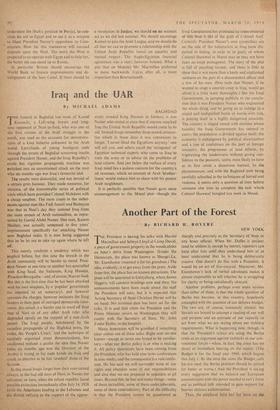Iraq and the UAR
By MICHAEL ADAMS IIIE funeral in Baghdad last week of Kamel Kasanchi, a Left-wing lawyer and long- time opponent of Nun i es-Said, who was one of the first victims of the brief struggle in the north, was used as the occasion for demonstra- tions of a kind hitherto unknown in the Arab world. Lorryloads of young hooligans rode through the streets of Baghdad screaming insults against President Nasser, and the Iraqi Republic's crude but vigorous propaganda machine was switched into an unrestrained attack on the man who six months ago was Iraq's favourite idol.
The results were distasteful, and not devoid of a certain grim humour. They made nonsense, for instance, of the interminable series of political trials which have provided Colonel Mahdawi with a cheap soapbox. The main count in the indict- ments against men like Fad! Jamali and Bashayan was that in Nun's day they isolated Iraq from the main stream of Arab nationalism, as repre- sented by G'amal Abdel Nasser. One man, K,azem Haidari, was actually sentenced to five years' imprisonment specifically for attacking Nasser over Baghdad radio. It is now being suggested that he be let out to take up again where he left off.
This merely confirms a tendency which was implicit before, but this time the breach in the Arab community will be harder to mend. Presi- dent Nasser at one time or another has quarrelled with King Saud, the Sudanese, King Hussein, President Bourguiba—and, of course, N uri es-Said.
But this is the first time that he has been attacked with his own weapons, by a `popular' government (as opposed to an autocracy), and .however specious the charges, however insincere the Iraqi .leaders in their pose of outraged democratic inno- cence, this attack is a harder one to ward off than that of Nun or of any other Arab ruler who depended openly on the support of a non-Arab power. The Iraqi people, belaboured by the ceaseless propaganda of the Baghdad press, the radio, the 'People's Court,' and the technique of carefully organised street demonstrations, has swallowed without a qualm the idea that Nasser (who six months ago was the liberator of the Arabs) is trying to lay rude hands on Iraq and crush its liberties as he has 'crushed' those of the Syrians.
In this mood Iraqis forget how their eyes turned always, in the bad old days of Nun, to Nasser for salvation; Or how, when the infant republic faced possible extinction immediately after July 14,1958 (with the Americans landing in the Lebanon and the British rallying to the support of the aggres- BAG H DAD sively minded King Hussein in Jordan), it was Nasser who stated at once that if anyone attacked Iraq the United Arab Republic would come 'to its aid. Instead Iraqis remember deep-seated animosi- ties which in those days it was convenient to forget. 'I never liked the Egyptians anyway,' one will tell you, and others recall the 'arrogance' of Egyptian technical experts who came to Iraq to train the army or to advise on the problems of land reform. And just below the surface of every traqi mind lies a jealous concern for the country's oil revenues, which no amount of Arab 'brother- . liness' would induce him to share with his poorer Arab neighbours.
It is perfectly possible that Nasser gave some encouragement to the Mosul plot—though the Iraqi Government has produced no more evidence of this than it did of the guilt of Colonel Aref. Certainly President Nasser's own sympathies are on the side of the nationalists in .1raq (now dis- persed in hiding, in exile or in gaol), of whom Colonel Shawwaf in Mosul may or may not have been an inept 'protagonist. The story of the plot is full of puzzling lacunx, and there is little to show that it was more than a hasty and unplanned outburst on the part of a discontented officer and a few of his men. (One feels that 'Nasser, if he wanted to stage a counter-coup in Iraq, would go about it a little more thoroughly.) But the Iraqi Government, in jumping publicly to the conclu- sion that it was President Nasser who engineered the whole thing, and by going on to indulge in a stupid and undignified battle of words with him, is putting itself in a highly dangerous situation. The country is ringed round with enemies whose hostility the Iraqi Government has seemed to court; the population is divided against itself; the economy is endangered by political u—ncertainties and a loss of confidence on the part of foreign investors; the programme of land reform, by frightening the landowners without giving con- fidence to the peasants, seems most likely to have as its first result a disastrous harvest. In the circumstances, and with the Baghdad mob being carefully schooled in the techniques of hatred and violence, it seems only a question of time before someone else tries to complete the task which Colonel Shawwaf bungled last week in Mosul.


































 Previous page
Previous page